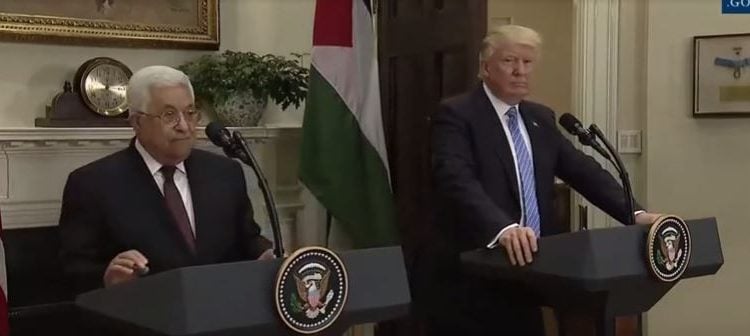“We will get it done,” Trump told Abbas at their first meeting in Washington, although the reason for his optimism towards achieving a sustainable peace deal between the Israelis and Palestinians was not apparent.
Despite bleak prospects for success, President Donald Trump promised on Wednesday “to do whatever is necessary” to forge an Israeli-Palestinian peace deal.
At a White House meeting with Palestinian leader Mahmoud Abbas, Trump pledged to reinvigorate the stalled Mideast peace process that has bedeviled his predecessors and said he would serve as “a mediator, an arbitrator or a facilitator” between the two sides. “We will get it done,” Trump confidently told Abbas.
“I’m committed to working with Israel and the Palestinians to reach an agreement,” Trump said. “But any agreement cannot be imposed by the United States or by any other nation. The Palestinians and Israelis must work together to reach an agreement that allows both peoples to live, worship, and thrive and prosper in peace.”
The source of Trump’s optimism was not immediately apparent. He offered no details about his effort or how it would be any different from attempts over the past two decades. Former Presidents Bill Clinton, George W. Bush and Barack Obama all tried and failed.
The peace process has been stalled since 2014, and there have been no serious attempts to restart negotiations.
Like previous U.S. leaders, Trump faces numerous obstacles in the long-shot bid. They include the contours of a potential Palestinian state, Jerusalem’s status and the question of Palestinian refugees. Complicating it all are the vehement Palestinian criticisms of Israeli construction in Judea and Samaria and the Israeli complaints that the Palestinian leadership, including Abbas, incites violence and terror.
Opposing Israeli, Palestinian Demands
Abbas said he is committed to peace, but he made clear Palestinian demands for a separate state based on borders that existed before the 1967 Mideast war, a capital in east Jerusalem and the return of Palestinian refugees.
“Our strategic option, our strategic choice is to bring about peace based on the vision of two states, a Palestinian state, with its capital of east Jerusalem, that lives in peace and stability with the state of Israel based on the borders of 1967,” he said.
Israel rejects the 1967 lines as a possible border, saying it would impose grave security risks. Israel also opposes Palestinian demands on refugees and insists on maintaining an undivided Jerusalem as the capital of the Jewish state.
Trump did not discuss any of those issues Wednesday. But in a February news conference with Israeli Prime Minister Benjamin Netanyahu, Trump broke with longtime U.S. policy by raising the idea of a one-state peace agreement, withholding clear support for an independent Palestine. U.S. officials quickly stressed afterward that Trump would support any arrangement agreed by the two sides.
U.S. officials had said ahead of Wednesday’s meeting that Trump would press Abbas to end payments to families of Palestinian terrorists imprisoned in Israeli jails. But Trump didn’t specifically mention that issue in his brief remarks after the Oval Office session.
Demand to End Funding to Terrorists Made Earlier
American officials said such a request was raised in preparatory talks with Palestinian officials. Three Republican senators urged a halt to such payments in a letter to Trump that reflected widespread opinion in Congress.
White House Press Secretary Sean Spicer told reporters that the issue was included during discussions earlier in the day, over lunch, as well as after the joint statement to the press.
“Some of the topics that were discussed during their meeting and the lunch were advancing the Israeli-Palestinian peace, preventing incitement to violence, particularly [from] media outlets directly associated with the Palestinian Authority, strengthening efforts to combat terrorism – including defeating ISIS – measures to empower the Palestinian economy and provide economic opportunity for the Palestinian people, and, additionally, the president raised concerns about the payments to Palestinian prisoners in Israeli jails who have committed acts of terror and to their families, and emphasized the need to resolve this issue,” Spicer said.
In the joint statement, however, Trump did directly implore the Palestinian leadership to end what Israel and the US say is anti-Israel rhetoric.
“There can be no lasting peace unless the Palestinian leaders speak in a unified voice against incitement to…violence, and hate,” the president said. “There’s such hatred, but hopefully there won’t be such hatred for very long.”
In his comments, Abbas praised Trump for his “leadership,” “courageous stewardship,” ”wisdom” and “great negotiating ability.”
Abbas Claims Palestinians Raised in ‘Culture of Peace’
Abbas said Palestinians are not cultivating a hatred of Israel as he rejected Trump’s position, which is also held by Netanyahu.
“I affirm to you that we are raising our youth, our children, our grandchildren on a culture of peace,” Abbas said, notwithstanding the anti-Israel hate and incitement to violence prevalent in Palestinian schools, media and cultural events.
Palestinian streets, squares and cultural institutions are frequently named after terrorists with blood on their hands. In a recent example of Palestinian incitement, a youth camp was named in honor of the leader of a mass-casualty terror attack, The PLO’s Supreme Council for Youth and Sports announced the naming a youth camp “Brothers of Dalal” after terrorist Dalal Mughrabi.
In 1978, Mughrabi led the Coastal Road massacre, in which Palestinian terrorists hijacked a bus and killed 37 Israeli civilians, including 12 children, and wounding over 70. It was one of the most horrific terror attacks in Israeli history.
Ramallah District Governor Ramallah Laila Ghannam, a Palestinian Authority (PA) official, praised the initiative for “remembering the pure-hearted Martyrs.”
By: AP and World Israel News Staff





